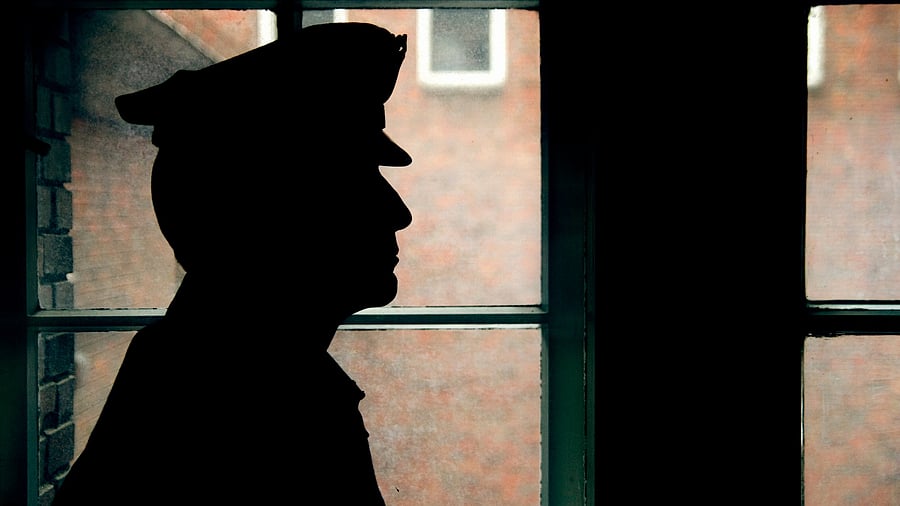
Representative image showing the silhouette of a police personnel
Credit: iStock Photo
When Akshay Shinde was gunned down in an ‘encounter’ on September 23, five weeks after his arrest for allegedly having sexually abused two four-year-olds in Badlapur, Shiv Sena members distributed sweets to train commuters, with banners hailing ‘Shinde Shahi’ (Eknath Shinde’s rule). A newspaper advertisement also lauded then Chief Minister Eknath Shinde for the killing, and he defended the ‘encounter’.
Not to be outdone, Devendra Fadnavis’ supporters put up hoardings of the then deputy chief minister holding a gun, with the words ‘Badla Pura’ (a pun on the Marathi words ‘revenge taken’) and ‘Devachya Nyaay’ (divine justice, with a pun on ‘Deva’: ‘Deva Bhau’ is Fadnavis’ popular nickname) on them. The Bharatiya Janata Party (BJP) distanced itself from this, yet, one party MLA reacted angrily when these hoardings were taken down by the authorities.
Before politicians jumped in to take credit for the police killing a suspect in its custody, residents of Badlapur, just outside Mumbai, blocked trains in a day-long protest against the way the school, which had BJP members in its management, and the police had handled the episode.
Akshay Shinde’s death put an end to all these issues. The anger then shifted to his parents: their home already vandalised, they were denied burial space for their son in nearby cemeteries, till the Bombay High Court forced the police to help them. Undeterred by all this, they approached the court for an inquiry into the ‘encounter’.
On January 20, the Bombay High Court ordered that an FIR be registered against the five cops present during the shooting. A magisterial inquiry, mandatory after every custodial death, revealed no fingerprints of the accused on the firearm allegedly used by him, and raised doubts about the police’s version. These doubts had been voiced by the court right at the start.
The FIR is a huge victory for the parents who’ve been reduced to begging on the streets after having been hounded out of their home for their son’s alleged crime. Indeed, had it not been for their petition, the ‘encounter’ might have gone unchallenged.
But the Shindes have crossed only the first step in the journey to bring their son’s killers to book. Experience shows that policemen accused of custodial deaths are a special kind of accused. The State that’s supposed to prosecute them goes out of their way to help them. Granting the necessary sanction to prosecute, appointing a special public prosecutor (mandatory in Maharashtra for custodial deaths), providing the necessary documents — all these are in the hands of the State.
The Shindes have already got a taste of this: the police only handed over all reports to the magistrate after the court ordered them to do so.
To prepare for what’s ahead, they would do well to talk to 75-year-old Asiya Begum, who’s fought for 20 years to get justice for her 27-year-old son. Computer engineer Khwaja Yunus reportedly went ‘missing’ while being transported in a police vehicle in January 2003. His father’s petition led to an inquiry which indicted 14 policemen. The government sanctioned prosecution for four, those escorting him in the vehicle. Their trial began 14 years after his death, and came to a standstill after the first witness deposed, because the special public prosecutor (the third to be appointed in the case) was sacked for being too conscientious. In 2020, the four policemen were reinstated.
The Shindes could also meet Leonard Valdaris, who’s been fighting since 2014 just to get the policemen allegedly responsible for his son’s death charged with murder. Like Asiya Begum, Valdaris has gone from court to court, including the Supreme Court.
As with Akshay Shinde, no one cared that Yunus, a Muslim terror-accused, was killed in custody, not even when all his co-accused were acquitted or discharged within three years. But in Shinde’s case, a factor stronger than popular opinion is the way the two most powerful men in Maharashtra took credit for his killing. Fadnavis continues to be the home minister, apart from being chief minister. It is he who will be the final authority in every decision taken in the case against the five policemen.
Khwaja Yunus’ father died within a year of his death; his mother has fought alone, helped only by a senior lawyer. The Shindes have already received death threats on social media, while their lawyer has been warned that his daughter would be raped.
As they take on the State, the Shindes need not just superhuman determination, but also, support from human rights groups.
(Jyoti Punwani is a senior journalist.)
Disclaimer: The views expressed above are the author's own. They do not necessarily reflect the views of DH.